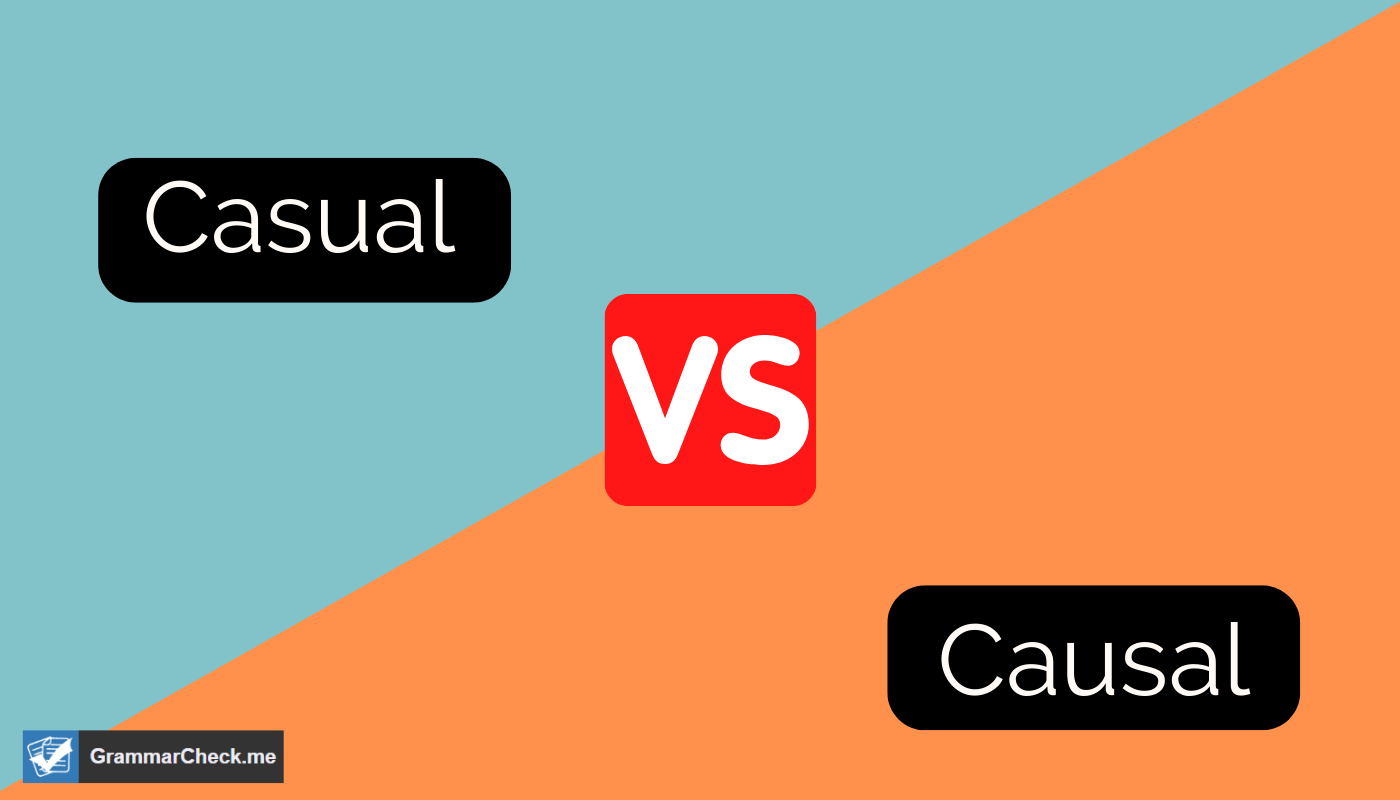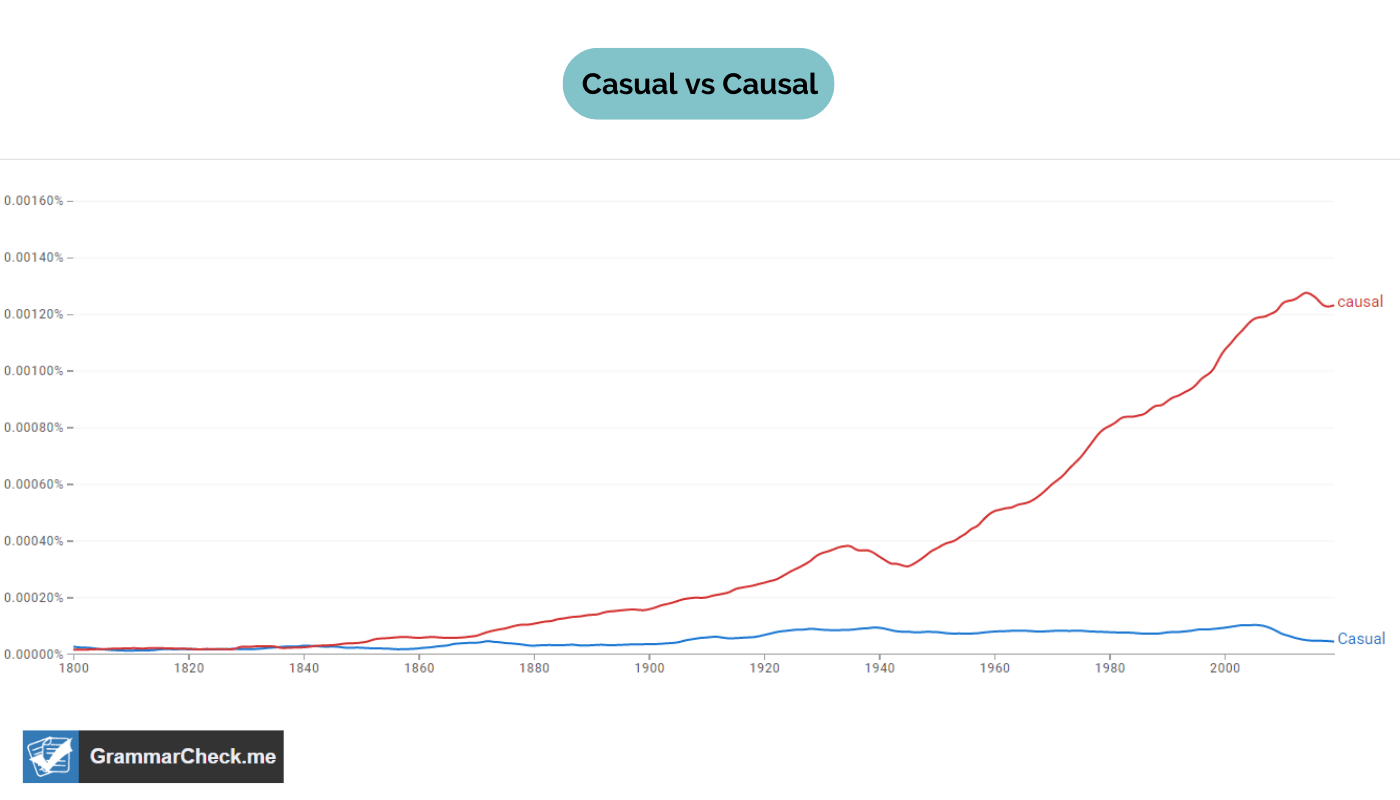The words “casual” and “causal” are very frequently confused by new writers for obvious reasons. After all, they are spelled almost identically! However, these words have two very different meanings. Using them interchangeably in your writing would be an embarrassing mistake. Luck for your, this article will help you make the distinction between casual vs causal so that you never make this mistake again!
Which Is Correct: Casual vs Causal?

The English language has many words that are spelled almost identically, but have different meanings. Think other than and other then for example. Casual and causal are a prime example. At first glance, these words seem almost identical. But which spelling is correct?
- Casual – An adjective that refers to something that is relaxed and informal.
- Causal – An adjective that refers to a relationship between two events in which one event directly causes the other.
Just like with the words ran vs run, spelling makes a huge difference. You can see that casual and causal have totally different meanings…even thought they are spelled almost identically.
Takeaway: Causal relationship implies that one thing or event caused another. Casual means that something is relaxed and laid back.
When To Use Casual
The word casual is much popular than the word causal in informal situations (i.e. conversations, text messages, etc.), just like the words yep versus yup. Which is ironic because the word casual itself means that something is informal or more relaxed!
- For example, a casual worker only works on an irregular or temporary basis. However, someone who works for a company occasionally does not get the same benefits (health insurance, PTO, etc.)
Here are some sentence examples:
- I always wear casual clothes on the weekends so I can relax and be comfortable.
- We decided to have a casual meeting at the coffee shop to discuss the project.
- I’m only looking for casual work at the moment because I’m still in school.

In formal situations like book publications, academic papers, and science reports the word causal is far more popular. Check out Google’s Ngram statistics if you don’t believe me! Just like we saw when analyzing vagrant vs hobo the popularity of vocabulary can significantly change over time!
When To Use Causal
Oftentimes, writers use the phrase causal relationship when they really mean a casual relationship! Just like the words for me or to me, writers get them confused!
The term “causal” refers to a relationship between two events. It implies that one event directly caused the other event occur.
Here are some great examples of causal relationships. In each of these examples, there is a causal link or causal connection between event #1 and event #2.
- Running a mile everyday (event #1) caused me to lose weight (event #2).
- Eating carrots every night (event #1) has lowered my blood pressure (event #2).
- I saved my money for 5 years (event #1) and now I can afford a house (event #2).
These types of causal relationships are important and are seen in many fields. This includes science, psychology, and statistics. The word causal is an adjective that can be turned into an adverb by adding -ly!
Different Use Cases For The Word ‘Casual’
In you daily life, chances are you have come across a few of these phrases in conversation and reading. Check them out!
- Casual Clothes – Casual clothes are comfortable, informal pieces of clothing that are suitable for everyday wear. You would not wear casual clothes to a formal event like a wedding. They are typically more relaxed and comfortable clothing options.
- Casual Meeting – A casual meeting is a gathering of people that is informal and unplanned. This is usually impromptu and does not have a formal agenda.
- Casual Observer – A casual observer is someone who is not closely involved in a situation or event, but who is observing it from a distance. This person represents a third party that is not invested in the situation at hand.
- Casual Work – Casual work refers to employment that is not permanent or full-time. Unlike full time employees, casual workers likely do not have benefits and retirement plans. They get paid hourly for a specific service.
Frequently Asked Questions
To say that one event is a cause of another means to say that the first event makes the second event happen. Causal is used to indicate or express the cause of something.
The 3 major types of causal relationships include common-cause, common-effect , causal chain relationships. Each causal relationship has its own unique meaning!
An example of causal example is that excessive eating causes weight gain. In other words, eating tons and tons of food will result in you gaining bodyfat.
In statistics, a casual relationship refers to a relationship between two variables in which one variable causes a change in the other. This means that when one variable changes, the other variable will also change in a predictable way.
The Bottom Line
By now you know the difference between the words “casual” and “causal”. These similar looking words have completely unrelated definitions, just like the words in page or on page. Use causal when trying to indicate the relationship between two things or events. Use casual when trying to indicate that something is informal or relaxed. Hopefully this spelling tip makes you a better writer!
